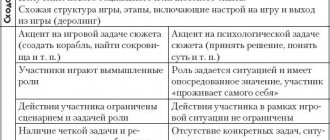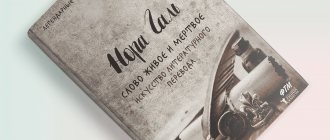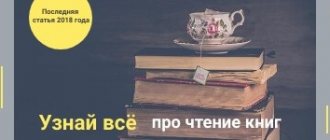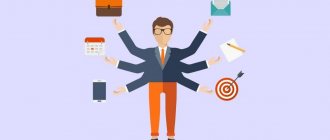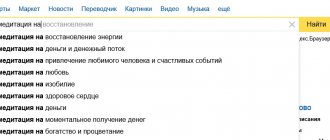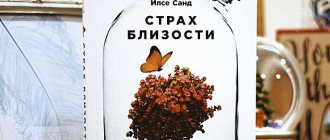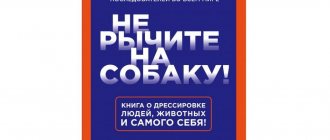In the modern world, many strive to become developed individuals; for this it is necessary to read smart books. Smart people make good decisions. In the books you will find information that will help you get a good job, find true friends, find your place in society, show all your strengths and expand your horizons.
Why expand your horizons?
By expanding our horizons, we:
- we notice new opportunities;
- We reveal our inner potential;
- We consider this or that situation from different sides.
An educated and erudite person is worth his weight in gold in our world. Society is looking for some distant source of knowledge, not understanding the simple truth: a book is the best teacher. We look for support in articles from the Internet, advice from our friends, some even manage to read quotes on social networks and think that they have taken a whole course in philosophy. A book is an irreplaceable source of knowledge; it is where you should look for support.
Now let's look at the definition of “smart books”.
Smart books are not a collection of quotes and advice on how to understand a given situation. They have a wonderful plot, after which you begin to engage in introspection, and introspection leads to the fact that you radically change your life for the better. There are not so many such works. As they say, you can count good books on the fingers of both hands, but just to find these books, you need to re-read thousands of works.
Fortunately, now people often write reviews of books, and making a choice is much easier.
A review is a critical article in which readers describe what they liked, what they didn’t like, etc. Thanks to such author reviews, you can create your own list of books. True, everyone has their own views on life, and if for one person some work was great, then you may not like it. It happens that a person simply understands the book differently or in his own way.
There is a list of so-called bestsellers that are loved by the whole world and are recommended by millions. They are truly worth your attention. Here's a list worth reading.
"Why Some Countries Are Rich and Others Poor" by Daron Acemoglu, James A. Robinson
kto-chto-gde.ru
You can study the economic situation of the country from different positions. The geographical principle takes as its basis the location of the state. Culturological - features of the development of culture over the centuries.
When writing the book, the authors were guided by the institutional principle. In their opinion, the development of the state depends on political and economic institutions. The leadership elite, which has concentrated all power in its hands, most often does not strive to improve the well-being of citizens, but thinks only about its own benefit. While rulers rebuild palaces and hire private jets for travel, the population may live below the poverty line, suffering from high taxes.
The authors are trying to find an answer to the question of why this happens. After all, high incomes of the people can become the foundation for even greater enrichment of the country’s leadership. Why do the vast masses oppose technological progress? And what causes the wealth of some states and the poverty of others?
Read
What do smart people read for spiritual development and intelligence?
Literature that can trigger thinking processes and help activate memory is suitable. Wanting to increase their IQ level, many people rely on the number of books they read. If the plot is not captivating, the exercises described seem ridiculous and useless, then it is better to put the book down and move on to the next one. Just reading will not make a person smarter , since the material will not be applied in life.
What smart things to read and how to raise your intellectual level?
Works of Edward de Bon . If you want to learn how to think differently, and are ready to break away from the standards, then start with the book “Six Thinking Hats.” While studying the material, you will have the opportunity to play. To get results, act and complete the author’s instructions. The book is interesting due to the inclusion of various life situations, to which the reader is invited to choose his thinking hats. Practical exercises help make thinking original and non-standard. Another entertaining book by the author is “Teach Yourself to Think.” The plot is based on Edward's technique, which helps instill in the reader the skill of wanting to learn and develop. The proposed methodology is aimed at improving the thinking mechanism. The book can be called a self-instruction manual, as it includes 5 stages. Gradual implementation of steps leads to the desired result. Books by Ron Hubbard . The book “Teaching Technology” received good reviews. It is a textbook whose main task is to teach the reader to learn. People who followed the author's tips increased their intellectual level by 15%. Ron Hubbard is convinced that a person's IQ is formed from several components. And the main one is the ability to learn, or in other words, the systematic acquisition of new information throughout a person’s life. In the book “Self-Analysis” the author focuses on human memory. If you don’t remember an interesting fact or historical information in a timely manner, then there’s no point in talking about intellectual development. The books you read will be forgotten after a few days if your memory is not fully activated. The book contains practical recommendations that help a person improve himself. The author pays special attention to visual memory, believing that there is a possibility of its development.
"Memory development for dummies . The title of the book makes clear its main purpose. Before you start studying, take it as a basis that there are no universal and simple ways to improve memory. To achieve results, techniques are combined. The more ways you use, the better the effect. Interestingly, the combination of methods brings results regardless of age. John Bogosian Arden, the author of the book, is confident that the properties of memory are the same in a student and a pensioner, and therefore can be developed in the same way.
Before you start reading books, check your level of intellectual development . There are tests on the Internet and suggested times for completing tasks. On your first playthrough, don’t rush to invest within the deadline. By answering test questions, you are already developing as you solve problems and puzzles. The data obtained will help you decide in which direction to move, what you lack: vocabulary, creative thinking, and the ability to memorize information. Then start correcting the situation by studying and practicing the suggested books.
"Genome. Autobiography of a Species in 23 Chapters by Matt Ridley
Genetics is developing rapidly. Its development is often compared to a revolution. Not only the general public, but also specialists do not have time to keep track of how our ideas about life and heredity are changing. This gives rise to a lot of rumors and speculation about terrible mutants that insidious scientists are churning out in their laboratories, while amazing discoveries of new methods for diagnosing and treating genetic diseases, including cancer, remain unnoticed or misunderstood. Matt Ridley's book is very relevant. In a simple and accessible way, the author presented the history of genetics from the first guesses to the stunning breakthrough that began with the discovery of the structure of DNA by Watson and Crick.
Read
“Why do we exist? The Greatest Story Ever Told by Lawrence Krauss
goodreads.com
Lawrence Krauss is sometimes called the Richard Dawkins of the hard sciences. He is a serious research physicist and one of the world's most famous science popularizers. From the very beginning, the book emphasizes that the picture of the world painted by science surpasses all religious epics in majesty. This grandiose narrative unfolds in Krauss on two levels: as the evolution of the Universe, which ultimately led to our existence, and as the evolution of our understanding of the structure of this Universe. The metaphor of Plato's cave runs throughout the book: step by step, science reveals illusions and moves towards the true reality that underlies our world. Krauss' guiding thread is light - not only the light of the mind, but also radiation itself, the properties of which are surprisingly rethought at all stages of the development of science - from mechanics through the theory of electromagnetic waves to the theory of relativity, quantum electrodynamics, particle physics and modern cosmology.
Read
What books are worth reading for self-development?
At the stage of realizing the wrong direction of your movement, the question arises: where to get adequate information and what are the general criteria for its adequacy? Today in the literature market there are many directions, genres, etc. - for every taste and color, as they say. Each of the authors presents himself as a kind of “enlightened” guru who has learned the truth. And it should be noted that most of them actually have adequate thoughts that are useful to think about, and even bring something into their lives. But, whatever one may say, everyone can still be mistaken, so in terms of choosing literature it is worth paying attention to more ancient texts.
In general, the question of which books to read for self-development is a purely individual question, since something different will suit everyone. Some people like ancient philosophical treatises, while others are more suited to works of art, which, in general, are sometimes not even inferior to some serious texts. Therefore, there are no bad or good books - every book is good for each level of development. And among fiction books one can also note many sources of invaluable wisdom.
- "The Alchemist" by Paulo Coelho.
A legendary book about the search for the spiritual path and truth. In simple and understandable language, using simple and understandable examples, a simple philosophy of life is unobtrusively presented to the reader. But, despite its simplicity, not many are ready to understand and accept it at a deep level. Many people understand it at the mental level and often even repeat these concepts out loud, but at a deep level there is no awareness. And the book allows you to look at the world from a different perspective. - "Chapaev and Emptiness" Pelevin
. The book describes two parallel realities: revolutionary Russia and Russia in the nineties. The teaching and philosophy of the Buddha (in a rather free interpretation, but very interesting) runs through the entire narrative. The book contains many interesting concepts and philosophical ideas, but most importantly, the author gives us the opportunity to look at our familiar reality from an unusual angle. - "Illusions" Richard Bach.
Also quite an interesting book. The book questions the reality that we are accustomed to consider objective, as well as the laws by which this world functions. An alternative view of reality, as well as unique methods of interaction with this reality, will be of interest to seekers of truth and those who want to know themselves and the world around them. - "The Little Prince" Antoine Exupery.
Through the mouth of the little Prince, the book sets out a worldview that is opposed to a consumerist and selfish view of the world. At first glance, this worldview is a little naive, but the further you dive into the written story, the more you understand that the Prince understands much more in this life than all the other characters, and indeed many people in this world. - "Master and Margarita".
Bulgakov. The book shows the difficult and thorny path of a creative person, a true Master of his craft, who found his destiny and followed it all his life. And this, in fact, is the deepest desire of every person - to find something to which they can devote their life. And the one who has found his path and learned his destiny is already halfway to perfection. - “Diagnostics of karma” Lazarev.
Not exactly a fiction book, its aspect is rather more applied and practical, but this only increases the value of the book. Sergey Lazarev in his book examines in detail the principle of action of karma, the features of its formation and implementation in human life. In the book you can find answers to many questions, the reasons for the presence of certain diseases and problems in life are discussed in particular detail.
You may also be interested in books about proper nutrition and a healthy lifestyle:
- "The Mucusless Diet" by Arnold Ehret. In the book, the author examines poor nutrition as the cause of the formation of mucus in the body, which causes aging, withering of the body and the development of diseases. The book discusses the concept of natural nutrition, according to which only fruits and some vegetables are the typical human food, and all other food is unnatural for human consumption and therefore destroys health.
- “Raw food diet is the path to immortality” Shemchuk.
The author considers the transition of humanity to boiled food as the main cause of not only illness, but also death in principle. The book discusses the version that with proper nutrition (proper nutrition is considered to be eating thermally unprocessed food), a person can not only be healed of any disease, but also completely defeat death. - "The 80/10/10 Diet" by Douglas Graham. The author proposes a diet in which 80% of the food consists of carbohydrates, 10% of proteins and 10% of fats. This diet involves mainly eating fruits, since, according to the author of the book, a person is frugivorous by nature and fruits are the most natural food for his nutrition.
The question of what books to read for self-development remains relevant for many. And for everyone, their answer will be relevant. Paradoxical as it may seem, someone can learn something for themselves even from detective novels. But there are books that everyone is recommended to read in this life in order to adequately perceive the world and have some kind of moral basis for interacting with this world. For this, it is recommended to familiarize yourself with the Vedic scriptures.
"AI Superpowers" by Kai-Fu Lee
entermedia.io
Kai-Fu Lee is one of the most famous experts in the field of artificial intelligence. Over a long and distinguished career, he has gained an insider's understanding of how US Silicon Valley and China's IT industry operate, so he confidently makes predictions about who will win the AI race and why.
But this victory could result in unemployment and unprecedented social stratification around the world. Catastrophe is almost inevitable, but after a serious personal crisis, Kai-Fu Lee saw an unexpected way out. It will be determined by humanity and responsibility, and not by an army of smart machines.
Read
Top self-development books: 10 best works for personal growth
Hel Elrod. “The magic of the morning. How the first hour of the day determines your success"
A good day begins with a good morning - a truth that does not require proof. American Hal Elrod developed this thesis even further and proved in practice that just one hour after waking up can not only make your day better, but change the quality of your life.
The author's personal story is worthy of film adaptation: he spent six minutes in a state of clinical death after the accident, his brain was seriously damaged and all his bones were broken. Contrary to doctors' predictions that he would no longer be able to walk, Hal Elrod not only got back on his feet, but even ran an ultramarathon.
Today, Elrod is one of the highest paid motivational coaches in the world. And in his books he shares personal experiences and life hacks that he has repeatedly tested on himself.
“Morning Magic” is a well-structured book with a clear step-by-step action plan. It is easy to read: all the tips are literally laid out on the shelves - just take it and do it.
By following Elrod's advice, you can not only achieve success, but also generally improve the quality of your life: work through health problems, learn to focus on important aspects and motivate yourself to grow.
Best quotes:
- “Always remember that if you cannot find time for self-development, then you will have to find time for pain, mental anguish and constant struggle.”
- “The outer world has always been and will be a reflection of our inner world. And success always parallels the level of our development as individuals. If we don’t take time every day and purposefully to develop the person who can create the life of our dreams, we will find it very, very difficult to achieve the desired result.”
Elena Rezanova “Never. How to get out of a dead end and find yourself”
Are you looking for your calling? Don't know how to understand what you really want? Then this book is exactly what you need now. It will be useful for those who have reached the peak of their career or simply feel stuck in the daily hustle and bustle.
Many of us often fall into the trap of “viral” expectations from life. For example, everyone around you thinks it’s cool to be the head of a department: recognition, money and some kind of future. But you yourself are simply disgusted by such a “career” - you are bored, there is nowhere to grow, you cannot realize your ambitions and you simply understand that you are wasting the best years of your life.
To shake yourself up, throw off false expectations and get out of a dead end, you need a serious shake-up. But you can do without strong life shocks. Elena Rezanova’s book will be a “magic kick-start” for you: you will learn how to overcome fear and doubts and finally make a breakthrough in life.
The author does not just talk abstractly about how to find yourself, but does this using the example of his own life. Elena is a career coach with extensive experience. She runs an informative blog and podcast where you can read examples from the book in even more detail.
My review of “Never Ever...”: coolly written, to the point and definitely motivating.
Best quotes:
- “Ambition turns on as soon as a person decides to live by his own rules, to do something significant and not waste his time on something unimportant. Because that’s what ambition is all about.”
- “It is dangerous to live in a situation of endlessly weighing a decision. Quit - don't quit, start - don't start, say - don't say, decide - don't decide, go - don't go, etc. This takes enormous amounts of energy. The longer you live in this mode, the less energy you have left for action.”
Tina Seelig. “Why didn’t anyone tell me this at 20? Intensive to find yourself in this world”
The main idea of this book is that there are no rules or restrictions at any age: everything is limited only by your imagination. This legendary work has long been stolen for quotes and every self-respecting coach uses the simple and understandable theses that Tina Seelig so successfully put together in one book.
I definitely recommend reading it to all aspiring entrepreneurs or those who want dramatic changes in their lives.
“Intensive..” from Seelig is included in my personal top books for self-development. She expands horizons, inspires and motivates. The world is full of opportunities and only you can decide whether to use them or not.
The book contains many personal examples, useful ideas and motivational points. There is no same recipe for success for everyone, but there is definitely one for everyone. How to see it? You can read about this in the book.
Best quotes:
- “The key to success is the ability to learn from each experience and move forward armed with that knowledge.”
- “The world is divided between people who long for someone else to give them permission to do what they like, and people who give themselves permission.”
Kelly McGonigal. "Strength of will. How to develop and strengthen”
An excellent manual for training the strong-willed qualities of a true leader. Do you like to put things off until later? Are you struggling with procrastination and laziness and losing valuable time? Then this book is 100% for you.
In 10 weeks you will “pump up the muscles” of your will, get rid of a bunch of bad habits and acquire useful ones. You will learn to control the situation and motivate yourself to take action.
This book is a kind of step-by-step instructions for training willpower. It will also become a journal of your achievements on the path to personal growth.
Each of the 10 chapters is a list of tasks for the week. It is entirely based on scientific research and personal experience of the author. There is no “water”, philosophical reflections or esoteric research here. Only a clear program of “training” of the will.
The main thing in reading this work is regular practice of all exercises in the stated sequence.
Best quotes:
- “To control yourself, you need to know what is truly important to you. This is the power of “I want.”
- “Track your decisions for at least one day. And in the evening, remember them and try to figure out which choices corresponded to your goals and which ones contradicted them. This exercise will also help you avoid distractions when you decide something, which will definitely strengthen your willpower.”
Carol Dweck. “Flexible consciousness”
A cool book for those who are afraid to take on something new or incomprehensible, for those who think that they have no talent or special abilities. “Flexible consciousness” will turn your stereotypical thinking upside down and give you a mindset for growth and success.
The trick of the work is also that it is not just the thoughts of an individual author or a personal biography, but a real scientific research. Carol Dweck has been studying human intelligence and its impact on success for more than 20 years. This book is the result of painstaking scientific work.
Briefly, its main points are as follows:
- there are two types of consciousness - fixed (fixed mindset) and flexible (growth mindset);
- people with the first type of consciousness are confident that success is determined by innate talent or acquired knowledge, they spend all their time proving this fact;
- people with a flexible type of consciousness are confident that any qualities can be developed and used to achieve their goals. They always strive for growth, learning, self-development and do not consider innate talents a guarantee of success.
As you might guess, it is this type of consciousness that opens up many opportunities, enhances productivity and motivates growth. The author explains in the book how to develop it in yourself and use it to your advantage in a very simple and understandable language.
Best quotes:
- “In the first world, effort is a bad thing. They, like failure, mean that you are not smart or talented. If you were smart and talented, you wouldn't have to make any effort. In the second world, effort is what makes you smart and talented.”
- “By accepting this or that attitude, you open up a new world for yourself. Where qualities are constant, success is proof of your intelligence or talent. In it you assert yourself. In another world - a world of changing virtues - you are drawn to master new things. You are developing yourself.”
Brian Tracy. “Get out of your comfort zone. Change your life. 21 methods to increase personal effectiveness”
If you ask me what to read for self-development in a quick, simple and understandable way, I will definitely recommend this book to you.
21 Ways to Achieve Better Results is a set of methods that really work, thanks to which you can improve your organizational skills, learn how to set priorities correctly, discover all your hidden capabilities and be able to work with maximum efficiency to achieve success in any field.
Brian Tracy's books do not need additional advertising - his name has long been widely known, and training programs on the psychology of success attract millions of listeners around the world.
“21 Methods” has been translated into 40 languages and sold almost one and a half million copies. The secret to the success of this bestseller is that it contains only practical advice that can be applied in life immediately after reading. The book also contains the results of scientific research by the author, who has been studying the psychology of success for more than 30 years.
Best quotes:
- “People who work effectively are disciplined in choosing the most important of all the tasks facing them. They, being able to force themselves to eat a frog, no matter how disgusting it may be, manage to do much more.”
- “An ordinary person who has no special talents, but who has managed to develop the habit of clearly setting priorities and quickly completing important tasks, can give a hundred points ahead to a genius who talks a lot, makes great plans, but finishes little.”
Greg McKeon. "Essentialism. The path to simplicity"
“Do less to achieve more” - this is how the main thesis of this book can be described in a nutshell. If you feel that you are working unproductively, that you are not getting anything done, and that your knowledge of time management is not giving the expected results, urgently read this revolutionary book.
Essentialism in the broad sense of the word is a philosophical doctrine that attributes a deep essence to things, which one must be able to distinguish. In the author’s interpretation, essentialism is the science of learning to see only the most essential and making efforts to solve extremely important tasks, and not all, as time management teaches.
Essentialism is not about productivity, not about time management strategy, but about doing only what needs to be done for maximum results.
The book tells how to learn to concentrate on important issues, use energy and time on the right tasks and people. Your resources are limited and need to be spent wisely.
How to do little but well, put things in order in your life, choose only the best and not occasionally, but on an ongoing basis - Greg McKeon will talk about this in his work.
Best quotes:
- “Research shows that we value the things we own more than they are actually worth, which is why we have such a hard time getting rid of them. If you are not completely sure, ask yourself a security question: “If I saw this item in a store, how much would I be willing to spend on it?”
- “Surprisingly, it is the desire for success that can cause failure. In other words, your own successes distract your attention from the more important things that led you to them. The paradox of success can be seen everywhere.”
Richard Branson “To hell with everything! Take it and do it!”
I think you’ve definitely heard about this damn talented and successful person. An eccentric billionaire, one of the most influential businessmen in the world and simply an extraordinary personality. Branson became famous not only for his successful entrepreneurial projects, but also for his unusual antics, such as dressing up as a flight attendant and serving passengers after a lost bet.
In 2022, Branson went into space on his own spacecraft and became the first space tourist, overtaking the richest person on the planet, Jeff Bezos. His company, Virgin Galactic, plans to launch mass tourist flights into space as early as 2022. In the meantime, he sells tickets to everyone for 250 thousand dollars apiece.
Branson's book is a real manifesto about the joy of life and taking risks. Life is too short to spend it on something you don’t like - that’s the author’s main message, and, you know, I simply have nothing to add to this. Besides the fact that this book should definitely be on your shelf: it inspires, charges with positivity and shows an example that if you really want to succeed, nothing can stop you.
Best quotes:
- “Live joyfully, work from the heart, and the money will come. Don't waste time - seize your chance. Have a positive outlook on life. If you're not happy with something, do something else."
- “Never try to just make money. True success, happiness and fulfillment will never come if your only goal is the pursuit of profit.”
Tasha Eurich. “Insight. Why we’re not as self-aware as we think we are, and why having a clear sense of self helps you succeed in work and in life.”
An unexpected look at the problem that “slows down” the qualitative growth of the individual. The author combines his own research with scientific research on the psychology of self-awareness and shows the reader how important a comprehensive understanding of oneself is for a successful and happy life.
The book is a pleasure and easy to read. After all, it describes situations that are understandable and familiar to each of us. The author asks important questions that will help you look at your life from the outside.
After reading, you will be able to understand your desires and goals, understand which of them are yours and which are imposed from the outside. Also an important component of “Insight” is the section about the direct influence of the people around you on your decisions and vice versa.
Best quotes:
- “It is much more tempting to look at ourselves through rose-colored glasses than to objectively evaluate who we are and how we look in the eyes of other people.”
- “Everything we hear is an opinion, not a fact. All we see is perspective, not truth.”
Maxim Dorofeev. “Jedi techniques. How to raise your monkey, empty your inbox and save your mental fuel.”
One of the coolest new products of recent times, which will allow you to pump up your brain and completely reboot your memory “files”. Maxim Dorofeev is a popular productivity trainer, and his blog and books from the “Jedi Techniques” series have long been sorted out on the Internet for quotes.
Are you sure that you know how to work: setting priorities, time management and all things to do, but in fact by the end of the day you feel like a squeezed lemon, forgetting important things and blaming yourself for not being organized? Then Dorofeev’s technique is what you need! And yes, you will like it, even if you have never watched “Star Wars” in your life and have no idea who the Jedi are (be sure to watch it - cool thing!).
The book contains really working methods that can save your brain from overload and complete burnout. It contains many useful techniques and productivity tricks. You will learn how our memory works in general, how we spend the resources of our brain, how to use them correctly, concentrate on what is important and successfully solve problems.
Best quotes:
- “How typical it is for us: to suffer from insomnia because of thoughts about work, and then at work to experience difficulties in performing even the simplest tasks, since we did not get enough sleep and our heads are not clear.”
- “Mindlessly procrastinating on tasks you hate doing now will result in the furthest corner of your to-do list becoming a procrastinogenic burial ground.”
“The best about us. Why there is less violence in the world, Steven Pinker
Faced with an endless stream of news about wars, crime and terrorism, it is not difficult to believe that we are living in the most terrible period in human history.
But Steven Pinker shows that the opposite is true: Violence has been declining for millennia, and we may be living in the most peaceful time in the history of our species.
In the past, wars, slavery, child abuse, murder, pogroms, mutilation, bloodshed and genocide were commonplace. But in our reality, Pinker proves (including with the help of more than a hundred graphs and maps) that all these types of violence have decreased significantly and are increasingly condemned by society everywhere.
Read
"The Big Four: The Success Secrets of Amazon, Apple, Facebook and Google" by Scott Galloway
Since the turn of the millennium, Apple, Amazon, Facebook and Google have radically changed the landscape of the global economy and patterns of consumption, communication and development. Even if you don't intend to compete or collaborate with any of the Big Four, you will have to live in a world where they dictate the rules. And to make your life as comfortable as possible, you should understand how these companies manage to maintain their influence.
Read
10 books to upgrade yourself and soft skills Related topics
10 books to upgrade yourself and soft skills
Assimilation of book information
So, we figured out how to read books so as not to abandon them, and to get the maximum information, benefit and pleasure from them.
Now it’s worth mentioning another side of studying literature - how to assimilate information? Assimilation of information is a strong memorization and understanding of what is read. Of course, it is recommended to reread a good book several times, but in order for the effect to be maximum, you should follow some rules:
1. Talk about what you read.
This can be an unpleasant surprise for your interlocutors if you overdo it too much, but to a reasonable extent, talking about what you read will help you not only remember what you read and understand it, but also develop a culture of speech, since the transfer of such information itself strives for a competent appearance. Under successful circumstances, you may even be considered a person with a broad outlook, which will add positive impressions from communication.
2. Retell what you read.
After reading even some part of the book, it is very useful to retell what you read. This way you will not only remember the information received much better, but also learn how to correctly express your thoughts. Since the memories are fresh, it will be very easy to retell and absorb what you have read. Retelling will allow you to form not a set of information, but structured knowledge that is valued much more than scattered facts.
We also recommend this article: Mental attention is the main reason for concentration
3. Highlight what's important.
If you have an expensive edition or you just hate getting the book dirty, you can do this on a separate sheet. The important thing is not what you marked, but that by marking, you highlighted certain information, concentrating on it, which leaves a fairly vivid imprint in your memory, allowing you to remember what you highlighted. And by returning to study the book, you can not only focus your attention on what was highlighted, but also understand what was a priority for you when you read the book in the past.
“The sixth extinction. Unnatural History by Elizabeth Colbert
newyorker.com
Over the past 500 million years, the Earth has experienced five mass extinctions. The Sixth Extinction is happening right now, and this time it is caused entirely by human activity. A staff writer for The New Yorker, Elizabeth Kolbert traced the stories of several extinct species still living near us, visiting different parts of the globe and talking with leading scientists. Why are human activities so destructive to other species? Can we stop the Sixth Extinction?
Read
“Utopia for realists. How to Build an Ideal World by Rutger Bregman
kitobz.com
Universal basic income, open borders and a fifteen-hour work week seem like an unattainable utopia to us. But consider this: for most of history, humanity has been poor, hungry, and sick. Only in the last 200 years has everything changed: billions of people suddenly found themselves safe, rich, well-fed and healthy. In other words, we now live in a world that would have seemed like paradise to our ancestors. It's time to set new ambitious goals and strive for an even more beautiful future. In this book, Rutger Bregman tells us what dreams we should pursue and argues that we can soon build a new utopia: a utopia for realists.
Read
“Risking my own skin. The Hidden Asymmetries of Everyday Life by Nassim Nicholas Taleb
“Risking Your Own Skin” is part of the Incerto (“Uncertain”) series, which addresses four main issues: the uncertainty of knowledge, symmetry in relationships between people, the distribution of information and rationality in complex world systems.
In his new, sharply provocative and at the same time extremely pragmatic book, Nicholas Nassim Taleb talks about how important it is to identify and filter nonsense, to distinguish theory from practice, superficial competence from the real one. You will learn what rationality is in complex systems and the real world, how symmetry and asymmetry are expressed, and what the logic of risk taking is.
Bringing new meaning to familiar concepts such as “a just society,” “professional success,” and “personal responsibility,” and without fear of hurting the egos of established idols, Taleb debunks the hypocritical ideas and actions of military apologists, stock market investors, and religious preachers. Using the examples of Hammurabi and Jesus Christ, Roman and Byzantine emperors, Seneca and Donald Trump, Taleb shows that the most important quality that unites renowned heroes, selfless saints and brilliant businessmen is not to transfer risk to others.
Read
"The Design of Common Things" by Don Norman
This is Donald Norman's classic book about the things around us and why they were created that way.
Donald Norman sorts out dozens of objects that we use every day, giving an interesting and reasoned discussion about the mistakes made during their design. Beautiful does not always mean comfortable. Sometimes a kettle can be dangerous, and the front door can throw you out of balance.
“Design of Common Things” is a real reference book of design discoveries and mistakes. The book is worth reading for both those who create design and those who use it.
Read
“Nonviolent communication. The Language of Life, Marshall Rosenberg
Nonviolent Communication (NVC) is improving the lives of thousands of people. It applies in the marital bedroom, in the classroom, at the conference table, and on the front line. It is never too late to renounce violence for the benefit of all concerned.
The founder of the NVC method, Marshall Rosenberg, explains its essence in detail and uses numerous examples from his practice as a peacemaker to show how to use it. The new edition of the book adds a chapter on “Conflict Resolution and Mediation.”
Read
The role of books in human development.
An important stage in the formation of a person’s personality and his path of development is theoretical knowledge and the acquisition of information, which a person receives, for the most part, through books. For this reason, it is important to choose the right literature that would contribute to development without discouraging the desire to move on. And here we should understand one of the main principles of development: consistency. What does it mean?
The principle of consistency.
Sequence, in the context of literature selection, means a chronological sequence of books that:
- Gave the person the maximum amount of information.
- It would not cause him difficulties in reading, both stylistically, and would be simple in terminology.
- Was understandable.
- It would increase motivation, making you want to continue reading.
- I would gradually increase the complexity (value) of the information .
The principle of consistency applies not only to reading, but to most other areas of human life to which development is applicable. Learning a language begins with letters, then syllables, then words, phrases, sentences, and so on. This is how a person learns to write and speak. The same principle applies to the physical side of life, that is, at first, training begins with a little tension, and then it increases more and more, increasing the physical indicators that the training is aimed at.
In connection with this principle, you should approximately determine your own reading ability. In other words, if you have never read books meaningfully or have read very little, then it is better to start with simple books. If you have a lot of experience, then you can move on to literature, which contains more information.
Why is it important? In most cases, when a person ambitiously takes on a complex work without having the experience of being well-read, he very quickly loses the meaning or forgets what he read, or constantly gets confused, or reading this book seems excessively difficult to him. A book like this should just be put aside for later.
“Theory U: Leadership from the Future”, Otto Scharmer
mail.sergeidovlatov.com
This book is written for leaders and active advocates of change in corporations, governments, non-governmental organizations and communities.
The book is centered on the U-process and the concept of sentient presence (presence and sense of the present) developed within its framework. The key question that Otto Scharmer poses is: what kind of leader should he be and how should he act, based not on what is now, but on the future as it comes?
Read
The complexity of literature
Fiction
The simplest literature that carries a semantic load is fiction. It may not be an encyclopedia on self-development, but through images, such literature can give us an understanding of certain subjects much deeper than if it were presented to us directly. In terms of complexity-benefit ratio, fiction is a great place to start, because it develops reading skills, gives food for thought, broadens one’s horizons and generally allows one to be interesting to oneself.
Basic literature
The second most difficult, I would call literature, which is written for a wide range of readers, on a specific topic. Let's designate it as “ basic ”. Usually these are books written by intermediaries between the reader and those people who are very deep in a certain area. Such books, for example, are popular science literature, in which the information is quite simplified, but at the same time provides a lot of basic information for those who are looking into this area for the first time.
In other words, such a book is of no interest to a scientist, and at some points a highly qualified specialist may find some inconsistencies or errors in it, because usually these books are written by writers rather than scientists. However, for a person who does not understand this area, such literature is an excellent start for studying an in-depth level in any area.
We also recommend this article: Conditionality: the principle of dependence of a person’s character on the world
Profound Literature
The next most complex literature is either academic works , or primary sources , or scientific works of individual outstanding individuals.
Academic works are intended for a narrow circle of specialists, therefore, without knowing the topic, it is even quite difficult to simply read it, not to mention the semantic perception.
Primary sources are the origins of ideas that were written by prominent people or they could be sacred texts. They are quite complex for independent study and, basically, for a complete and correct understanding, they require either huge comments or a very long study. Sometimes this study must be critical, which is quite difficult for an ordinary person to do.
The works of individual outstanding individuals are complex for the reason that they are aimed not at finding fame or wealth, but at expressing the facet of truth that they observe. And, accordingly, in order to correctly understand such works, you need to be a truly educated person who is familiar not only with the area in which the work was written, but also understands the author, which is only possible with detailed and expert knowledge of the rest of his works.
Thus, you begin to understand your level of capabilities and where you should start studying literature. It is best, of course, to start with fiction; it is quite exciting reading and contributes to the development of a wide range of skills such as reading, communication, imaginative thinking, the ability to express thoughts, the ability to write correctly, etc. So, don't neglect the basics. In my experience, most people give up studying something because they are unable to concentrate or find the strength to continue studying one text for any length of time. Namely, these skills come in the process of casually reading pleasant literature, which teaches you to enjoy reading.
"The Innovator's Dilemma: How New Technologies Kill Strong Companies" by Clayton M. Christensen
entrepreneur.com
Sometimes industry leading companies lose their position in the market - this happens suddenly, but in fact such an outcome can be predicted. According to Clayton, when a company enters a new niche or when new technologies spread to the market, the enterprise has a chance to fail. The author proves with convincing examples: it is during the period of takeoff that management should be most attentive to their company in order to avoid failure.
Read
“We are all mortal. What is dear to us at the very end and how medicine can help here,” Atul Gawande
chronologium.wordpress.com
We love stories about 90-year-old marathon runners and Kilimanjaro climbers. They perpetuate the illusion that “Age is just a number on a passport.” We do not want to discuss the topics of aging and death and think that “closer to the point” we will somehow deal with the problems that old age will bring us. And we are wrong about this.
Atul Gawande, a surgeon, Harvard professor and expert in healthcare optimization, is sure that the problem is that we have not yet learned to grow old. In his new book, the doctor talks in detail about what age does to our bodies and explains how to reduce the inevitable troubles of aging - moral and physical - to a minimum.
Read
List of smart books that everyone should read
1. Greg McKeon “Essentialism. The path to simplicity." Do you feel like you work a lot but get little done? This book will help you set priorities, tell you what you need to concentrate on and what is not worth your attention at all. You will learn to manage your time and focus on the things that really matter.
2. Mark Rhodes "How to talk to anyone." Do you feel comfortable in society? Can you be called the life of the party, or are you a reserved and shy person? No matter who you are, there is nothing wrong with that. However, it is important to understand that every new acquaintance in your life, every dialogue and even a five-minute conversation can be useful for your career or the development of friendships. This book will teach you to enjoy communicating with other people, cope with difficult situations, and feel confident with other people.
3. Jim Collins "Good to Great." This book talks about the experiences of well-known companies (Philip Morris, Abbott, Circuit City, etc.) that went from good to outstanding. The author analyzes what ideas and concepts will allow any company to achieve incredible success and advance in its activities. By the way, Jim Collins wrote the second volume - “How the Great Die.” Here the author poses the question: how do companies whose indestructibility seemed eternal turn into dust and fall into oblivion? Can this be avoided in the early stages?
4. David Newman “Take it and do it.” If you are the leader of a small or large business, then you have to try on many roles. One of them is the role of a marketer. How to effectively attract and work with customers is of concern to every marketer. The book contains ideas that can be used “here and now.”
5. Alice Muir “Self-Confidence” This book will teach you to say “no”, be more stress-resistant, cope effectively with criticism and control your emotions in any situation.
6. Daniel Goleman “Emotional Intelligence” The author of the book claims that emotions play a big role in achieving success both in the workplace and in personal life. If you want to learn how to restrain your emotions and guess others, cope with temper and anger, then this book is definitely for you.
7. Angels Navarro “Memory does not fail.” Agree, almost everyone dreams of a good memory. And the author of this book offers effective methods and specific exercises that will help you develop your skills to the maximum. Here you will find fascinating puzzles and interesting tasks, and also learn more about the capabilities of the human brain.
8. Jack Lewis and Adrian Webster "The Brain: A Quick Guide." We regularly go to the gym to keep our body in good shape. The brain also needs constant training, without this it is impossible to use it to its full potential. Do you want to develop phenomenal abilities, think broadly and creatively, and be more productive? Then help your brain!
9. Bo Burlingham "Great, not big." What is more important to you: getting as much profit as possible or becoming the best in your field, in your business? This book will explain that you need to strive to become a professional, not a millionaire, and then you will get both.
10. Isaac Adizes “Reflections on Personal Development” This book is a collection of the author’s reflections, namely reflections, and not scientific research. Isaac Adizes gives his readers topics to discuss, entering into a mental conversation with them. Somewhere he gives wise advice, and somewhere he shares his personal experiences. This book is for those who want answers to simple life questions.
All these books are perfect for self-development. Many scientists have said: in order to become smarter, it is absolutely unimportant to know everything, it is important to understand everything. Choose books from this list and work on yourself.
"The Power of Myth" by Joseph Campbell
The author reveals the secrets of the influence of myths on modern life, for example, how the relationship between spouses in a modern marriage depends on the myth of the virgin birth of Jesus Christ and how this is embodied in the work of John Lennon. You'll discover how symbols from ancient stories continue to influence our modern understanding of the mysteries of birth, death, love and war.
Campbell draws parallels between the stories of the gods and goddesses of ancient Greece and Rome, the traditions of Buddhism, Hinduism and Christianity, and explores a wide range of themes that define the universality of human experience across time and culture.
Read
Increase Your Effectiveness: Reading from Google's Chief Product Officer Related topics
Increase Your Effectiveness: Reading from Google's Chief Product Officer
"Of course you're kidding, Mr. Feynman!", Richard Feynman
lastici.ru
American physicist Richard Feynman is one of the creators of quantum electrodynamics, a Nobel laureate, but above all, an extraordinary multifaceted personality who does not fit into the usual framework of the image of a “man of science.”
He was known for his passion for jokes and pranks, painted amazing portraits, and played exotic musical instruments. An excellent speaker, he turned each of his lectures into an exciting intellectual game. Not only students and colleagues, but also people simply passionate about physics were eager to attend his speeches.
He described his credo as a popularizer of science with one brilliant phrase: “If you are a scientist, a quantum physicist, and cannot explain in a nutshell to a five-year-old child what you do, you are a charlatan.”
Read
"Principles" by Ray Dalio
Ray Dalio grew up in an ordinary family with average income, and now he is included in the list of the 100 most influential people on the planet (according to Time) and the 100 richest people in the world (according to Forbes). The investment firm he founded at age 26, Bridgewater Associates, over the next 40 years became the fifth most important private company in the United States (according to Fortune). The secret of its stability and success is that Ray Dalio strictly adheres to universal principles in life and work, which gradually crystallized from the patterns of victories and defeats. The power of these personal principles is such that they changed the entire industry (CIO magazine even called Dalio the “Steve Jobs of investing”).
Read
What books should you read to improve your intelligence?
Most intellectual sites offer a list of books for developing the mind, improving speech and increasing vocabulary in communication - such a list includes literature that touches on various areas of life . The development of memory, improvement of vocabulary and the ability to think is the basis that is used to process information: in order to become a well-rounded person, it is necessary to expand knowledge in the main areas.
What educational books should you read to become smarter, increase your IQ and speak beautifully?
Scientific works . We are not talking about reference books and encyclopedias consisting of continuous incomprehensible terms. Read books that tell the story of the creation of the world, about natural phenomena, the development of culture and art. Remember Darwin's theory, read Hawking's works on the history of time. Philosophical Literature . Scientific books are built on theories, evidence and teach you to understand the world. Philosophy is a branch that initiates into the secrets of human actions and actions, studies the thinking of people. Include biblical publications of various religions in the list of philosophical literature. Today, many are interested in Eastern authors and share their wisdom on social networks. A prominent representative of Eastern philosophy is Omar Khayyam and his Rubai. Interesting to read, easy to learn by heart. Supplement your study of philosophy with books by the Strugatskys, Nietzsche, and Kant. Works of art . Knowledge of the classics is like an exam for entry into an intellectual society. The smartest books for adults that develop the intellect, brain and personality will be useless without the foundation received in due time - the foundations are laid from school, a love of poetry and prose is instilled. If you missed this period without wanting to read the classics, then it's time to catch up. Literary works help to replenish vocabulary and improve literacy. Start with the following books: “The Master and Margarita” by Bulgakov, “Forget-Me-Nots” by Prishvin, “Crime and Punishment” by Dostoevsky, “Red and Black” by Stendhal, “War and Peace” by Tolstoy. The modern intellectual writer Dyusimbiev Gazinur and his stories will perfectly complement the list of classic works. Historical books . Man is accustomed to comparing today's events with past ones. An intellectual is able to draw parallels at a high level, since he knows the history of the development of his country and other states. Reading historical books gives knowledge about significant events in the world and reveals the peculiarities of the lives of famous people. History helps us understand life. Find works by popular authors: Lawrence, Bushkov, Yuri Mukhin. Reading poetry . Poems are one of the oldest ways of transmitting information to descendants. The genre is light due to rhyme, euphony and beauty of speech. Constantly reading poetry helps improve memory and expand vocabulary. The works of Akhmatova, Shakespeare, Brodsky are suitable for the development of intelligence.
There is no specific list of literature for the development of intelligence. There are reading recommendations for schoolchildren, students, and applicants preparing to enter universities. The main thing is to develop reading skills . Use your free time to get information. Modern gadgets and audiobooks will come to help. Over time, you will notice that reading will become a habit. There will be a need to immerse yourself in a fascinating world filled with knowledge and discoveries.
"The origins of morality. In Search of Humanity in Primates, Frans de Waal
For many years, the world famous biologist Frans de Waal studied the life of chimpanzees and bonobo monkeys. In the process of research, he identified clear rudiments of ethical behavior in the primate community. According to the author, morality is not a purely human property, and its origins must be sought in animals. Empathy and other manifestations of a kind of morality are inherent in monkeys, dogs, elephants, and even reptiles.
In addition to a fascinating story about ethical behavior in the world of primates, the author raises deep philosophical questions related to science and religion. How and when did morality arise? What influence did religion have on the formation of ethics? What happens to a society where the role of religion is declining, and is Dostoevsky’s hero Ivan Karamazov right, who believed that if there is no God, then everything is permitted.
Read
List of books for children
It’s easier for adults to decide on literature, but what to do if you want to develop a child’s intelligence and abilities? In this case, you need a completely different material. These can be books in a question-and-answer format, which contain the most common children's questions and answers to them, or a book with an instructive plot. So, a list of books for children.
Elena Poleznaya “The Unexplored Attic.” How many amazing and incredible things surround us around us! Explore the world with the fairy tales of Elena Poleznaya: in an accessible and resourceful way, the author will help you explain to your children about the benefits of Dandelion, why the Moon changes, or what secrets an unknown attic might hold?
Where the Wild Things Are by Maurice Sendak Conflicts between parents and children are a standard story. This book will give your child the opportunity to understand why parents act this way and not otherwise in various situations. This book has become a classic of children's literature.
Paul Gallico "Thomasina" This book is an amazing story about a man who forgot what love is, a girl who loved her cat very much, and a cat who considered herself a goddess. The book will teach children to appreciate their loved ones.
Michael Ende "Momo". This is a story about a girl who had the gift of listening to other people. She enters into an unequal struggle with the world of the Gray Masters, the world of pragmatists and materialists who have forgotten about human values. This book will clearly demonstrate to a child what empathy, kindness and compassion are.
Julia Donaldson "The Gruffalo" This is a fairy tale, written in verse, for children 6-7 years old. It tells the story of a brave mouse's journey through a dense forest, who has invented an animal protector named Gruffalo and is trying to outwit other animals. The book will teach children not to be afraid of difficulties.
David McKee "Elmer" Elmer is a colorful checkered elephant with a great sense of humor and original thinking. But sometimes he wants to be like everyone else - a simple gray elephant. The book will teach children not to be afraid to be unique.
Sam McBratney Do You Know How Much I Love You? This book will be useful for both children6 and adults, as it is dedicated to the wonderful feeling of love, which cannot be measured.
Eric Carle "The Very Hungry Caterpillar" This is a book for very young children that tells how a fat caterpillar turns into a beautiful butterfly.
Kenneth Grahame "The Wind in the Willows" This is a story about how mutual assistance, courage and kindness help heroes overcome all trials. A work for all ages.
Daniel Pennac "Dog Dog". A story about a stray dog who finally finds his owner.
Roald Dahl "Matilda". A story about a unique girl who draws you into the magical world of childhood and makes you believe in miracles. It’s worth reading for adults too, so they can learn to understand children.
